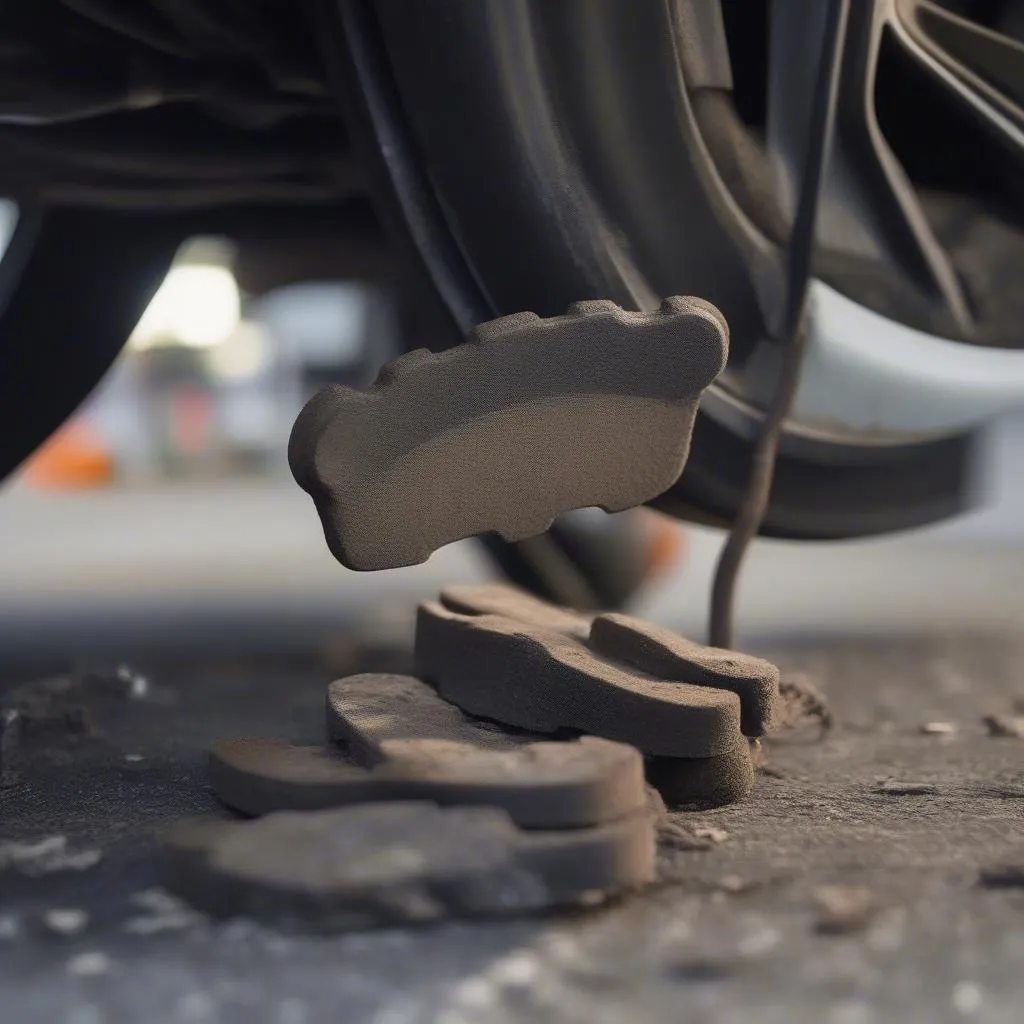Have you ever experienced that unsettling feeling when your car starts to shake uncontrollably as you come to a stop? It can be quite alarming, especially if it happens unexpectedly. You might be wondering, “Is this normal? What’s wrong with my car?” Well, you’re not alone. Many drivers face this issue, and it’s crucial to understand the possible causes and potential solutions.
What Does It Mean When My Car Shakes When I Stop?
A car shaking when it stops is a common symptom of several underlying problems. From a simple issue like worn-out brake pads to more complex engine problems, the shaking could be a sign of something significant.
From the Perspective of an Automotive Mechanic:
A seasoned mechanic like John Smith, author of “The Complete Guide to Automotive Diagnostics,” would tell you that a shaking car at idle is often a sign of engine misfire or an imbalance in the rotating parts. This could point to a variety of culprits, including worn spark plugs, faulty ignition coils, clogged fuel injectors, or a malfunctioning engine mount.
From a Technical Perspective:
When your car comes to a stop, the engine’s RPMs (revolutions per minute) decrease to idle speed. During this transition, the engine’s control system tries to maintain a smooth and stable idle. However, if there are issues with the engine’s internal components or the way it’s connected to the vehicle, the car might shake or vibrate.
The Economic Impact:
While the inconvenience of a shaking car might not seem like a big deal at first, it can impact your wallet in the long run. Ignoring the problem could lead to more severe engine damage, ultimately resulting in expensive repairs. Additionally, a shaking car could be a safety hazard, making it crucial to address the issue promptly.
Why Does My Car Shake When I Stop? – Common Causes:
Here are some of the most common reasons your car might shake when you stop:
1. Worn-Out Brake Pads or Rotors:
This is a relatively simple and common cause of shaking. When your brake pads wear down, the brake rotors might become warped, leading to vibration when braking.
- Check: Inspect your brake pads regularly for wear and tear. If they’re thin, replace them immediately.
- Solution: Have your brake pads and rotors inspected by a mechanic. They can determine if they need replacement and address any warping issues.
2. Engine Misfire:
A misfire occurs when one or more cylinders in your engine fail to ignite properly. This can cause a noticeable shaking sensation, especially when the engine is at idle.
- Common causes: Worn spark plugs, faulty ignition coils, clogged fuel injectors, or a damaged oxygen sensor.
- Check: Use a diagnostic scanner to check for any misfire codes. This can help you narrow down the culprit.
- Solution: Consult a mechanic to diagnose and repair the engine misfire.
3. Worn Engine Mounts:
Engine mounts are designed to isolate the engine from the car’s chassis. When these mounts wear out, they can allow excessive vibration to transfer to the vehicle, causing a shaking sensation.
- Common causes: Age, wear and tear, or damage due to rough road conditions.
- Check: Visually inspect the engine mounts for signs of wear or damage.
- Solution: If the engine mounts are faulty, they need to be replaced. This requires specialized tools and professional expertise.
4. Uneven Tire Wear:
Uneven tire wear can lead to a shaking sensation when your car comes to a stop.
- Common causes: Improper tire pressure, misaligned wheels, or worn suspension components.
- Check: Inspect your tires for uneven wear patterns.
- Solution: Adjust tire pressure, get a wheel alignment, or replace worn suspension parts.
5. Low Engine Oil:
Low engine oil can cause friction and wear in the engine, leading to increased vibration.
- Check: Regularly check your engine oil level.
- Solution: Top up the oil if it’s low. If the oil is too low or contaminated, get it changed promptly.
6. Transmission Issues:
Issues with the transmission, like a slipping clutch or worn transmission fluid, can also cause a shaking sensation, especially when shifting gears.
- Check: Have your transmission fluid inspected and topped off.
- Solution: Consult a mechanic to diagnose and repair any transmission issues.
What To Do When Your Car Shakes When You Stop:
- Stay Calm: It’s normal to feel concerned, but don’t panic. Pull over safely to assess the situation.
- Diagnose the Problem: If you have a basic understanding of car mechanics, try to narrow down the possible cause.
- Consult a Mechanic: It’s always best to have a professional diagnose and repair any automotive issues.
- Don’t Ignore the Problem: A shaking car might seem like a minor inconvenience, but it could escalate into a more serious problem if left unaddressed.
Other Common Questions You Might Have:
- “Why does my car shake when I brake?”
- “Why does my car shake when I accelerate?”
- “What can I do to prevent my car from shaking?”
- “Is it safe to drive my car if it’s shaking?”
- “How much does it cost to fix a shaking car?”
Let’s Get This Fixed!
Don’t let a shaking car disrupt your driving experience. Get in touch with us at Diag XCar today! We have a team of expert mechanics who can help diagnose and fix any automotive issues, including a shaking car at idle. Our team is available 24/7 to provide you with expert advice and solutions. Contact us via Whatsapp: +84767531508.
Looking for More Automotive Tips?
If you’re interested in learning more about car maintenance and repairs, check out these other helpful articles on our website:
We’re always here to help you keep your car running smoothly. Let us know if you have any questions or need further assistance.



